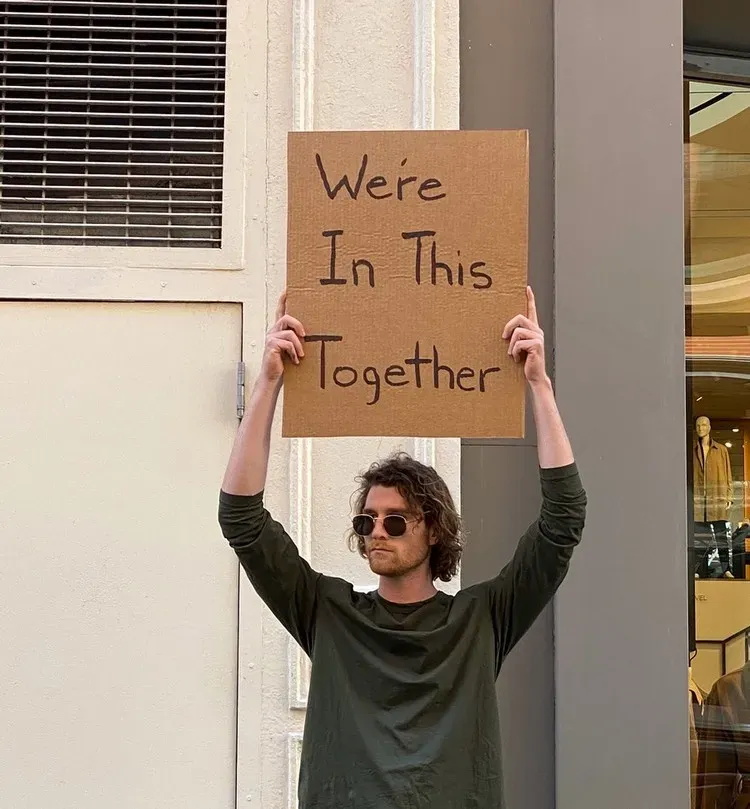Dude With Sign, the sensation sweeping Instagram, features Seth Phillips holding a simple yet witty cardboard sign with humorous takeaways on contemporary life. Quickly amassing a following of over eight million, this account not only showcases relatable memes but also shines a light on the often blurred lines of internet culture and copyright. Recently, Phillips and his company, Jerry Media, took legal action against several brands for unauthorized use of his image and memes, igniting discussions on the intricacies of Instagram meme copyright. As brand engagement increasingly relies on viral content, the question of ownership surfaces, revealing how commercial use can clash with artistic expression. With lawsuits numbering seven against various companies, the Dude With Sign phenomenon underscores the evolving nature of digital marketing and intellectual property in today’s social media landscape.
The character known as the “Dude With Sign” has evolved into a defining figure in the realm of social media humor, capturing the essence of modern-day internet funny through highly shareable images. Seth Phillips, the man behind this clever persona, has unknowingly stirred a hornet’s nest with his brand of humor, leading to numerous copyright disputes with companies that have utilized his likeness. As the popularity of quirky Instagram accounts continues to surge, issues surrounding meme ownership and brand representation are coming to the forefront. This rise in digital cultural phenomena prompts deeper reflection on how memes intertwine with advertising practices. The controversies surrounding the legalities and moral implications of such memes emphasize the need for clarity in the fast-paced world of internet marketing.
Understanding the Legal Landscape of Meme Copyright
In today’s digital world, copyright issues surrounding memes have gained significant attention. As individuals and brands increasingly leverage internet culture for marketing, the line between creative expression and copyright infringement becomes blurred. The legality of using someone else’s likeness, especially in popular formats like memes, raises questions that are being tested in court as illustrated by the recent lawsuits against brands by Jerry Media. By utilizing images that include characters or concepts created by others, brands risk infringing on the original copyright, as seen in the cases involving Seth Phillips, also known as the Dude With Sign.
Most notably, the @dudewithsign Instagram account has highlighted these intricate legal dynamics. Jerry Media’s lawsuits emphasize their commitment to protecting their intellectual property, arguing that unauthorized use of Phillips’s likeness can mislead audiences into believing there exists a paid partnership or endorsement. This situation underscores the necessity for brands to obtain explicit permissions when employing meme-based advertisements, as the ramifications of copyright infringement can lead not only to financial damages but also reputational harm.
Dude With Sign: A Comedy Icon in Internet Culture
Since its inception, the @dudewithsign account has become a comedic staple within internet culture. Its appeal lies in the relatable humor presented through simple yet impactful sign messages, which often resonate with a large audience. Created by Seth Phillips, the account’s blend of visual and textual humor appeals to the millennial and Gen Z demographics who frequently inhabit social media platforms like Instagram. As a result, the account has amassed millions of followers, demonstrating the power of concise and clever commentary on everyday frustrations.
However, this popularity does not come without its challenges. The rapid virality of memes can lead to unintended consequences, particularly regarding their use in commercial advertising. The trademarks and underlying rights associated with Dude With Sign have already been contentious given Jerry Media’s recent litigation efforts. These issues serve as a reminder of the precarious nature of meme culture; while it thrives on sharing and remixing content, brands must navigate these waters carefully to avoid legal pitfalls.
The Role of Jerry Media in Meme Creation and Controversy
Jerry Media, as the force behind @dudewithsign, illustrates the complex relationship between meme creation and copyright protection. Founded by Elliot Tebele, the company initially capitalized on viral content without stringent regard for copyright, resulting in significant backlash and accusations of joke theft. This historical context enriches the understanding of their current stance on copyright infringement. As they pursue lawsuits against brands, it reflects a shift towards a more protective model for original content creation cultivated through their accounts.
The irony is palpable; while Jerry Media once profited from leveraging other creators’ work, they are now vigilant in defending their own intellectual property with Seth Phillips’s likeness. This evolution raises critical questions about the ethical implications of meme usage, the responsibility of content creators, and how the viral nature of the internet can impede or enhance a brand’s image. Jerry Media’s actions against brands using the Dude With Sign signifies an essential remapping of meme-related copyright law, potentially leading toward clearer guidelines in the future.
The Implications of Meme Marketing for Brands
The wave of lawsuits filed by Jerry Media emphasizes the importance of understanding meme marketing’s intricate implications for brands. In an age where humor and relatability drive engagement on social media, companies must carefully navigate how they incorporate popular meme formats in their marketing strategies. Utilizing recognizable characters like the Dude With Sign can yield viral marketing campaigns; however, without proper permissions and licensing, brands risk facing legal repercussions that could be costly.
Moreover, brands need to educate themselves about copyright laws tied to internet culture. The settlements and lawsuits related to @dudewithsign serve as a clear warning that the playful use of memes in advertising cannot be a free-for-all. Firms must collaborate with copyright holders or properly license art to ensure compliance while still effectively engaging their target market. This proactive assessment can pave the way for both innovative marketing and lawful practices, balancing the fine line between creativity and legal boundaries.
Navigating the Fine Line Between Parody and Infringement
The conversation around parody versus infringement often comes to a head in discussions about memes and their commercial use. Parody, defined as a humorous or satirical take on an original work, is legally protected under the doctrine of fair use. In contrast, unauthorized use of an original image for commercial gain can trigger copyright violations, as demonstrated by recent legal actions taken by Jerry Media. The lawsuits emphasize the complexity of determining what constitutes fair use in internet culture and highlight the necessity for brands to tread carefully.
This legal distinction draws attention to how brands approach meme-based advertising. While parodies of recognizable figures or characters can be created, inserting a commercial agenda transforms the intention and often leads to potential copyright claims. The Dude With Sign’s image must be treated with respect as creators like Seth Phillips seek to monetize their original content. Therefore, companies should engage in due diligence by ensuring that any parody used aligns within legal guidelines to avoid backlash and potential legal disputes.
The Evolution of Internet Memes as a Commercial Tool
Internet memes have evolved from mere digital humor to powerful commercial tools that can drive engagement and sales. Brands increasingly recognize the ability of memes to encapsulate feelings and messages quickly, using them as a pathway to connect with a digital audience immersed in internet culture. However, the fine line between colloquial sharing and commercial exploitation poses unique challenges, especially as illustrated by ongoing legal efforts by Jerry Media pertaining to the Dude With Sign.
Understanding meme evolution is vital for marketers aiming to create tasteful, legally sound content that resonates with their audience. It is essential for marketers to navigate the balance of capitalizing on internet culture while respecting original creators’ rights. As internet memes continue to evolve, brands that can capture this essence while adhering to copyright laws will forge lasting connections within the digital landscape.
Impact of Social Media Marketing on Modern Advertising Strategies
Modern advertising strategies must adapt to the dynamic social media landscape, where meme culture plays a significant role. Brands are increasingly leveraging platforms like Instagram and TikTok to engage potential customers through relatable content and humor, much like that embodied by Seth Phillips’s @dudewithsign. This shift towards a meme-centric approach highlights the necessity for brands to embrace creativity and wit, but it also demands an understanding of the legalities inherent in such designs.
The recent lawsuits emphasize that while memes can enhance brand visibility and consumer engagement, care must be taken to ensure that all content is used lawfully. The backlash faced by various brands that misappropriated the Dude With Sign memes serves as a cautionary tale, reminding marketers of the need for thorough research and legal clearance. As social media continues to evolve, advertising strategies must also evolve to prioritize compliance alongside creativity, ensuring sustainable brand growth.
Dude With Sign Memes and Their Effect on Brand Identity
Dude With Sign memes have become iconic components of contemporary brand identity, leveraging humor to create a relatable persona that attracts followers. The entertaining and often satirical nature of these memes allows brands to inject personality into their marketing, fostering deeper connections with consumers. This trend reflects a larger movement towards authenticity in branding, where memes can act as a vehicle for relatable commentary that enhances brand appeal.
However, it’s essential for brands to be cautious as they navigate the integration of such meme-based content into their marketing strategies. Missteps in ownership and attribution, as evidenced by Jerry Media’s legal action against offending brands, can erode consumer trust and lead to negative press. Therefore, brands must ensure that their usage of Dude With Sign memes aligns fully with best practices and copyright laws, allowing them to harness this powerful tool while safeguarding their reputations.
Lessons from the Dude With Sign Copyright Cases
The copyright cases involving the Dude With Sign serve as critical lessons for both brands and content creators navigating the complexities of digital content ownership. The lawsuits emphasize the importance of respecting intellectual property rights and understanding how memes can cross into unlawful territory when used in commercial contexts. For brands that relied on or modified the Dude With Sign for marketing, these instances underline the need for diligence in verifying the appropriateness of content usage before launching campaigns.
These lessons extend beyond the immediate implications for the brands involved, impacting the larger frameworks of copyright in the digital realm. As the internet continues to evolve, and memes become further entwined with commerce, it remains critical for all stakeholders to engage in discussions about ownership and usage rights. The Dude With Sign cases remind us that the landscape of internet culture, while rich and vibrant, is subject to the same legal frameworks that govern traditional forms of art and media.
Frequently Asked Questions
What is the significance of Seth Phillips in the Dude With Sign memes?
Seth Phillips is the creator behind the popular Instagram account @dudewithsign, where he humorously addresses modern life with amusing signs. His unique style has made Dude With Sign a prominent part of internet culture, boasting over 8 million followers.
Why is Jerry Media suing brands over Dude With Sign content?
Jerry Media, which owns the Dude With Sign brand, has filed multiple lawsuits against brands that used Seth Phillips’s image without authorization. These lawsuits address copyright infringement and the misleading suggestion of endorsement when brands modify Phillips’s iconic images for commercial use.
How does copyright infringement relate to Dude With Sign memes?
Dude With Sign memes fall under copyright protection because Jerry Media holds rights to Seth Phillips’s likeness and the original images. Brands leveraging these images without permission violate copyright laws, leading Jerry Media to pursue legal action.
Can I share Dude With Sign memes on social media?
While sharing Dude With Sign memes for personal use often falls within fair use, using them for commercial purposes without permission could lead to legal issues, as highlighted by Jerry Media’s lawsuits against brands.
What was the outcome of the lawsuits against brands using Dude With Sign images?
Many of the lawsuits filed by Jerry Media against companies using Dude With Sign content have been dismissed, typically following settlements or the removal of the infringing posts. However, these cases underline the importance of securing rights before using copyrighted material.
How did Jerry Media’s past affect its relationship with memes and Dude With Sign?
Jerry Media’s past controversies, particularly with accounts like @fuckjerry, have complicated its current stance on meme ownership and copyright. Although many criticized their appropriation of memes, they now assert strict control over Dude With Sign content to protect its brand.
What are some examples of brands involved in Dude With Sign lawsuits?
Brands like Avid, All Access Dietetics, BruMate, and Snak Club have faced lawsuits from Jerry Media for improperly using Dude With Sign memes in a way that suggests endorsement or commercial partnership without consent.
Why is Dude With Sign a relevant topic in internet culture?
Dude With Sign encapsulates how humor and social commentary intersect with internet marketing. Its viral content raises questions about copyright, meme usage, and the commercialization of social media, making it a significant case study in contemporary internet culture.
What did Jerry Media’s lawyer say about the use of Dude With Sign images?
Jerry Media’s lawyer noted that while sharing original content for personal use is generally acceptable, using those images in a way that misrepresents endorsements or suggests commercial partnerships without permission is not tolerated.
What does the backlash against Jerry Media reveal about internet meme culture?
The backlash against Jerry Media, particularly with the #fuckfuckjerry movement, highlights the tensions between meme creation, copyright, and ethical content sharing within internet culture, emphasizing the need for accountability in the use of online memes.
| Key Point | Details |
|---|---|
| Dude With Sign Account | Instagram account featuring Seth Phillips holding humorous signs; 8 million followers. |
| Jerry Media Lawsuits | Jerry Media has filed seven lawsuits against brands for unauthorized use of Dude With Sign imagery. |
| Brands Involved | Companies like Avid, All Access Dietetics, Itchy, BruMate, RQ Insurance, and Snak Club have faced lawsuits. |
| Legal Basis | Lawsuits argue copyright infringement and false endorsement due to unauthorized meme use by brands. |
| Public Perception | While Jerry Media defends its content, it has faced past criticism for meme appropriation. |
| Internet Culture Impact | The incident shows complexities of meme usage in advertising and copyright issues. |
Summary
Dude With Sign is making waves in the legal arena as Jerry Media takes action against brands that misuse its content. With seven lawsuits filed against companies for unauthorized use of the Dude With Sign images, the issue highlights the ongoing battle between meme culture and copyright law. As brands navigate the fine line of using popular memes, this situation serves as a reminder of the importance of proper permissions in the digital landscape.



